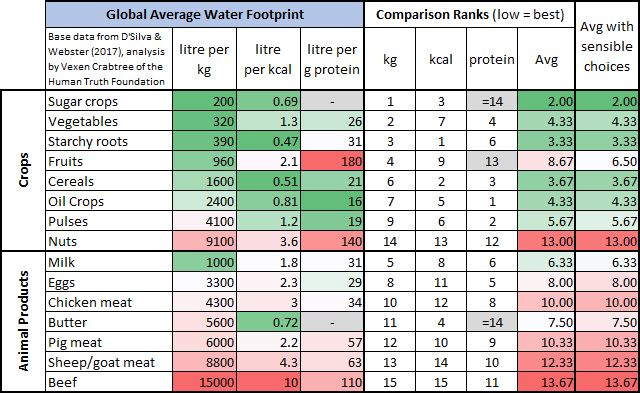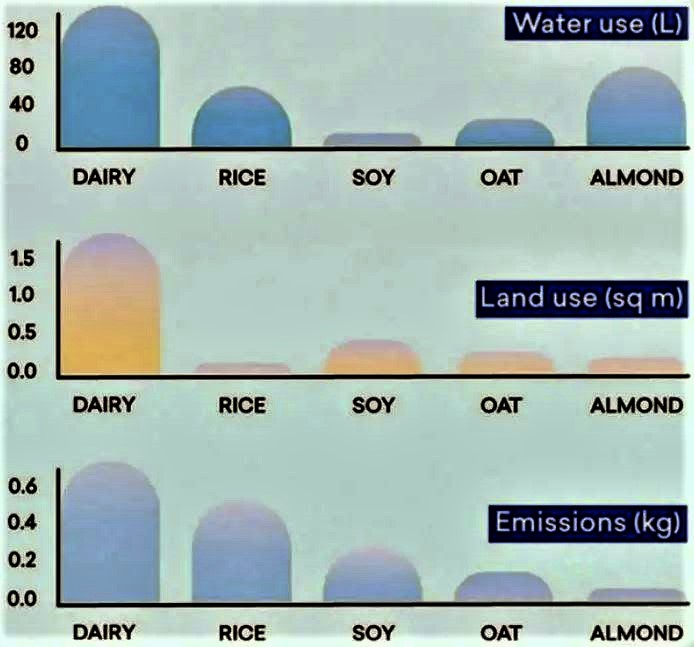Vegetarian (Plant-Based) Diets Use Much Less Freshwater than Carnivorous Diets
https://www.humantruth.info/water_and_meat.html
By Vexen Crabtree 2023
Vegan diets overall use 54% less water than meat-heavy diets1; the prevalence of agriculture for meat is adding pressure to global freshwater supplies2,3,4 which are already stressed5,6,7. Already, "up to 90% of all managed water is used to grow food"2 (some say 92%4) and within the next 20 years the human population is going to increase by a further 2 billion2,8: finding enough freshwater is going to be "one of the greatest challenges facing governments"2,9. Pollution from poo-intensive animals such as cows and chicken have a noticeable effect on river and water pollution in the surrounding area5.
Some meats are worse than others; red meat is particularly problematic. The best foods for calories, in terms of water use, are starchy roots, cereals and sugar crops (butter is next if you don't want to count sugar as a sensible food choice) - the worst are beef, sheep & goat meat, and nuts. The best foods for protein are oil crops, pulses, and cereals; despite common opinion, beef is a very poor source of protein from a water-usage point of view.
Milk has a similar profile; diary milk uses around double the amount of water than alternatives such as rice milk, oat milk and almond milk, and, soya milk uses 12 times less water3. Dr Dana Hunnes, at UCLA Sustainability, says that overall "a plant-based diet can reduce [global] water consumption [in food production] by up to 50 percent"3.
- Meat Production Uses More Water Than Plant-Based Food
- Dairy Milk, Rice Milk, Soy Milk, Oat Milk and Almond Milk
- The Benefits and Dangers of Vegetarianism
- Links
1. Meat Production Uses More Water Than Plant-Based Food
#population #sustainability #water
Currently, one-third of the world's population lives with "water scarcity"6 and within the next 20 years, the human population is going to increase by a further 2 billion2,8. Finding enough freshwater is going to be "one of the greatest challenges facing governments"2. Agricultural scientists say that meat-based diets use more water, and switching away from them will help global water supplies2; the importance of this is difficult to emphasize. Of all freshwater available to us as a species, 70% is used for food1. Of the water we directly manage, 92% goes into agriculture, and of that, meat products use several times more for their output than do crop-based foods.
Western diets in particular have too much meat, using 5,000 litres of water a day per person compared with vegetarians elsewhere, who use 1,000-2,000 litres, according to Dr David Molden of the International Water Management Institute (2004)2.
“One single component in the total water footprint of humanity stands out: the water footprint related to the consumption of animal products. About 92 per cent of humanity's water footprint is related to the consumption of agricultural products: only 4.7 per cent relates to industrial products and 3.8 per cent to domestic water consumption. [...] Animal products generally have a much larger water footprint per kilogram or calorific value than crop products. This means that if people consider reducing their water footprint, they are advised to look critically at their diet rather than at their water use in the kitchen, bathroom and garden. [...] According to the Food and Agriculture Organization of the United Nations, around 35 per cent of the cereals produced in the world are used for animal feed. [..] From a water-saving point of view it is obviously more efficient to eat the crops directly rather than indirectly by having them first processed into meat.”
"The Water Footprint of Animal Products" by Arjen Hoekstra4
The following table shows the water-efficiency of major food types, with green colouring showing the best, and red-colouring showing the worst performers. Sadly, comparable data from Hoekstra didn't include fish. The sensible choices column allows for the fact that no-one would attempt to eat fruit as a source of protein; and likewise, also omits sugar and butter from the calculation (they are greyed out).

Source: Arjen Hoekstra4
This isn't nutritional advice, but, strictly information on water-usage. It wouldn't be healthy to just east sugar and vegetables.
The best for calories, in terms of water use, are (1) starchy roots, (2) cereals and (3) sugar crops. But if you don't count sugar as a sensible food choice, then, (4) butter is next. Avoid beef, sheep & goat meat, and nuts.
Best for protein are (1) oil crops, (2) pulses, and (3) cereals. Avoid fruits, nuts and beef.
The overall effect is a combination of all of the foodtypes used in typical diets. There is already international data on how various diets fare in terms of water usage:
“Western diets, which depend largely on meat, are already putting great pressures on the environment. Meat-eaters consume the equivalent of about 5,000 litres of water a day compared to the 1,000-2,000 litres used by people on vegetarian diets in developing countries.”
Dr David Molden
International Water Management Institute? (2004)2
“Currently up to 90% of all managed water is used to grow food. [...] On average, it takes 1,790 litres of water to grow 1kg of wheat compared with 9,680 litres of water for 1kg of beef.”
The Guardian (2004)2
Although it isn't as simple as comparing beef to wheat, of course, there have been much more research into the holistic effects of different diets over the past decade or two. Dr Dana Hunnes, at the University of California Institute of the Environment & Sustainability (UCLA Sustainability), says that overall "a plant-based diet can reduce water consumption by up to 50 percent"3.
“The consensus emerging among scientists is that it will be almost impossible to feed future generations the typical diet eaten in western Europe and North America without destroying the environment.”
The Guardian (2004)2
2. Dairy Milk, Rice Milk, Soy Milk, Oat Milk and Almond Milk
#climate_change #food #veganism #vegetarianism
Other animal-based produce, such as milk, has a similar profile, using significantly more water and land space than alternatives such as rice milk, soy milk, oat milk and almond milk. The alternatives use up to twelve times less of those; even the worst-performing are still substantially more efficient. All the plant-based alternatives also produce much less carbon emissions.

Source: UCLA Sustainability3